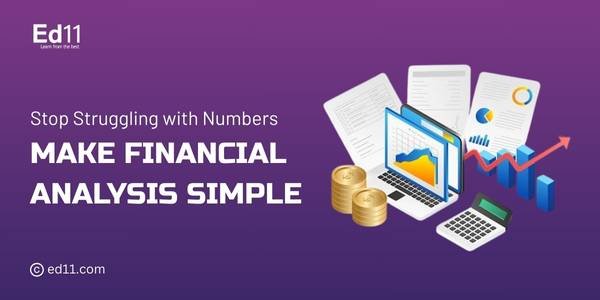Financial Analysis and Accounting Made Easy
Learn financial analysis and accounting in simple steps. Understand basics, manage finances, and improve your skills with easy online learning.

In the changing business world, companies and individuals depend greatly on financial analysis and accounting for smart decision-making and financial growth. Financial analysis and accounting are not just about numbers but about understanding the true financial health of a company or an individual. My first introduction to financial analysis and accounting was during my college days, and it seemed like a complex world filled with numbers, calculations, and reports. However, as I explored more, I realized the real value and importance of financial analysis and accounting in every business sector. Later, as an accounting specialist, I observed how financial analysis and accounting helped companies avoid financial risks, make better investments, and plan a sustainable future.
What are financial analysis and accounting?
Financial analysis and accounting refer to the process of examining financial data to understand a company’s performance and future potential. Financial analysis involves evaluating financial statements like income statements, balance sheets, and cash flow statements. Accounting, on the other hand, deals with recording, summarizing, and reporting financial transactions. Together, financial analysis and accounting help businesses monitor profitability, manage costs, and ensure regulatory compliance.
Essential Skills for Financial Analysis and Accounting
Mastering financial analysis and accounting requires a blend of technical, analytical, and communication skills. Here are the key skills you should focus on.
- Analytical Thinking
Ability to interpret financial data and identify trends, patterns, and problems.
Analyze financial statements to assess business performance. -
Strong Knowledge of Accounting Principles
Understanding of Basic Accounting Concepts & Standards (GAAP/IFRS).
Application of the Golden Rules of Accounting for accurate record-keeping. -
Financial Reporting Skills
Preparing key financial statements:
balance sheet, income statement (P&L account). -
Ratio Analysis & Financial Metrics
Calculation & Interpretation of Liquidity Ratios and
Profitability Ratios. -
Use of Accounting Software & Tools
Familiarity with tools like Tally ERP and QuickBooks. -
Attention to Detail
Accuracy in recording transactions and preparing reports.
Ability to spot errors or irregularities in financial data.
Real-World Applications of Financial Analysis
Financial analysis plays a crucial role in real-world business scenarios. Let’s look at some practical examples:
-
Startups: New businesses use financial analysis to determine their break-even point, monitor burn rate, and attract investors.
-
Corporations: Large organizations conduct in-depth analysis to make strategic decisions, such as mergers and acquisitions.
-
Banks and Lenders: Creditworthiness is assessed through financial analysis of applicants’ balance sheets and cash flows.
-
Investors: Before investing, individuals and firms analyze financial ratios and company performance.
-
Government and Nonprofits: These entities use financial analysis to ensure transparency and accountability.
Tips for Beginners in Financial Analysis
For beginners in financial analysis, it's essential to build a strong foundation in basic accounting and financial concepts such as income statements, balance sheets, and cash flow statements. Understanding how these financial statements interrelate will help in assessing a company's performance accurately.
- Start with the Basics: Learn fundamental accounting principles and how to read financial statements.
-
Use Real Examples: Practice analyzing publicly available financial reports of companies.
-
Get Hands-On with Software: Familiarize yourself with Excel and accounting tools.
-
Take a Course: Enroll in financial analysis courses that offer practical assignments and certifications.
-
Ask Questions: Don’t just accept numbers at face value. Investigate anomalies and trends.
-
Build a Portfolio: Showcase your analysis through case studies or sample reports.
-
Stay Curious: Finance is dynamic. Keep reading, watching, and exploring new insights.
Tools & Techniques of Financial Analysis
Financial analysis involves various tools and techniques to evaluate a company’s financial health, performance, and prospects. These tools help in effective decision-making for management, investors, and stakeholders.
- Financial Statements Analysis
Key financial statements used the balance sheet and
income statement. -
Comparative Financial Statements
Compare financial data of two or more periods to identify growth, trends, or decline.
Example: Sales in 2023 vs. 2024. -
Common Size Statements
Express all items as a percentage of a base figure, like sales or total assets.
Helps in easy comparison across companies or industries. -
Trend Analysis
Study of financial data over time to identify patterns and growth trends.
Example: Increase in revenue, expenses, or profit over 5 years. -
Cash Flow Analysis
Analyze inflows & outflows of cash in
operating activities and
Investing activities. -
Break-even Analysis
Determines the point where total revenue equals total cost.
Helpful for pricing decisions and cost control.
Benefits of Learning Financial Analysis and Accounting

-
Better Financial Management: Learning financial analysis and accounting provides individuals with the skills to manage finances efficiently. It helps in budgeting, expense tracking, and investment planning.
-
Career Opportunities: Professionals skilled in financial analysis and accounting are always in demand. From financial analysts to accountants, there are numerous career options in the finance, banking, and corporate sectors.
-
Business Growth: Financial analysis and accounting help businesses identify profit-making areas and cut down on unnecessary expenses. This directly contributes to business growth and sustainability.
-
Risk Management: With financial analysis and accounting, companies can predict potential risks and prepare strategies to mitigate them. It ensures financial stability even in challenging times.
-
Compliance and Reporting: Proper financial analysis and accounting ensure that companies comply with government regulations and tax laws. It reduces the risk of legal penalties and maintains a good reputation.
Best Online Tools & Resources for Financial Analysis & Accounting
Here is a list of the most useful online tools and learning resources to boost your skills in Financial
- Analysis & Accounting Accounting Software Tools
Tally ERP: Accounting, GST Filing, and Inventory Management.
QuickBooks: Cloud-Based Accounting & Bookkeeping. -
Financial Analysis Tools
Microsoft Excel: Financial Modeling, Ratio Analysis, Data Visualization.
Power BI: Business intelligence and data visualization tool. -
Learning Platforms for Financial Skills
Coursera: Financial Accounting, Financial Analysis, Excel Skills.
LinkedIn Learning: Accounting Fundamentals and Financial Reporting. -
Online Accounting Resources & Communities
Investopedia - Financial Terms & Concepts.
AccountingCoach—Free Accounting Tutorials & Practice Quizzes. -
Tools for Report Making & Presentations
Google Sheets/MS Excel Data Recording & Analysis.
Canva Designs Financial Reports & Presentations.
Financial analysis and accounting are essential skills for anyone who wants to succeed in the business world. It is no longer limited to finance professionals but has become a necessary skill for entrepreneurs, managers, and individuals. With the right learning approach and practical exposure, financial analysis and accounting can be mastered easily. As an accounting specialist, I have seen how these skills transform businesses and improve financial stability. Start your journey today and make financial analysis and accounting a powerful tool for your career and business growth.



















